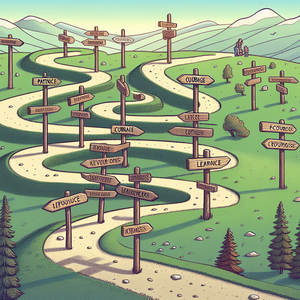HR and Mental Health: Building a Supportive Workplace

The workplace is where many individuals spend the majority of their waking hours, making it a crucial environment for mental health. According to the World Health Organization (WHO), depression and anxiety cost the global economy approximately $1 trillion each year in lost productivity. Furthermore, a study by the American Psychological Association revealed that 61% of employees believe their workplaces could do more to support mental health. These statistics underscore the urgency for HR to take action and create a culture that supports mental wellness.
Innovative Programs and Policies
One of the most common ways HR can support mental health is through Employee Assistance Programs. EAPs provide confidential counseling and resources for employees facing personal or work-related challenges. For instance, a manufacturing company in the Midwest implemented an EAP that not only offered counseling services but also included financial planning assistance. Employee participation in the program increased by 50% within the first year, leading to a noticeable improvement in overall employee morale and a decrease in absenteeism.
Mental Health Days
Recognizing the need for time off specifically for mental health reasons is another effective strategy. Organizations like the online streaming giant, Netflix, have adopted policies that allow employees to take mental health days without the stigma often associated with taking time off. This approach normalizes the conversation around mental health and encourages employees to prioritize their well-being, fostering a culture of openness and support. By doing so, companies can reduce the chances of burnout and promote a more sustainable work-life balance.
Training and Workshops
HR can also organize training programs and workshops focused on mental health awareness. For example, a tech startup in Silicon Valley launched a series of workshops led by mental health professionals, covering topics such as stress management and resilience building. These sessions not only equipped employees with valuable coping strategies but also created a safe space for them to discuss their mental health challenges openly. Such initiatives can empower employees, making them feel more supported and less isolated in their struggles.
Creating a Culture of Openness
Building a workplace culture that encourages open discussions about mental health is crucial. HR can lead this initiative by promoting storytelling sessions where employees share their experiences, thereby reducing stigma and fostering empathy. A notable example is a global bank that initiated a "Mental Health Awareness Week," featuring guest speakers and panel discussions. The event was well-received, leading to an increase in employees seeking help for mental health issues. This type of initiative not only raises awareness but also reinforces the message that mental health is a priority for the organization.
Supporting Examples and Evidence
The effectiveness of these initiatives is supported by various studies. Research published in the Journal of Occupational Health Psychology indicates that workplace interventions focusing on mental health can significantly enhance employee well-being and productivity. Companies that prioritize mental health see reduced absenteeism and turnover rates, ultimately leading to a healthier bottom line. Moreover, organizations like Google and Microsoft have reported that their mental health initiatives have led to higher employee satisfaction scores and increased engagement levels. These companies serve as powerful examples of how a proactive approach to mental health can yield substantial benefits. For instance, Google’s “gPause” program, which incorporates mindfulness and meditation sessions, has been shown to improve focus and reduce stress among employees.
As the conversation around mental health continues to evolve, HR professionals have a unique opportunity to lead the charge in creating supportive workplaces. By implementing innovative programs, fostering a culture of openness, and prioritizing mental well-being, HR can significantly impact employee satisfaction and productivity. As organizations recognize that a healthy workforce is a productive workforce, the role of HR in promoting mental health will only grow in importance. In this new era, the commitment to employee mental health is not just a moral obligation; it is a strategic imperative that can shape the future of work. By embracing the responsibility to cultivate a supportive environment for mental health, HR professionals not only enhance the quality of life for employees but also contribute to the long-term success of their organizations. The path forward is clear: prioritizing mental health is not just beneficial—it's essential.
Mental Health Program Coordinator
Large corporations, healthcare organizations, and educational institutions
Core Responsibilities
Design and implement mental health programs and initiatives tailored to employee needs.
Collaborate with HR and mental health professionals to assess the effectiveness of existing programs.
Facilitate workshops and training sessions on mental health awareness for employees and management.
Required Skills
Strong project management skills, with experience in program development.
Background in psychology, social work, or a related field.
Excellent communication skills to engage employees and promote mental health resources.
Employee Wellness Specialist
Corporate offices, fitness organizations, and health insurance companies
Core Responsibilities
Develop and promote wellness initiatives that enhance employees' physical and mental well-being.
Analyze employee health data to identify trends and areas for improvement.
Organize health fairs and wellness challenges to encourage employee participation.
Required Skills
Expertise in health promotion and behavior change strategies.
Familiarity with workplace wellness programs and best practices.
Ability to work collaboratively with a diverse workforce.
HR Business Partner (Mental Health Focus)
Multinational corporations, consulting firms, and non-profit organizations
Core Responsibilities
Partner with management to integrate mental health strategies into business operations.
Provide training and support for leaders on mental health issues and best practices.
Monitor employee feedback and mental health metrics to inform HR policies.
Required Skills
Strong knowledge of employment law and mental health legislation.
Experience in organizational development and change management.
Proven ability to influence and drive change within organizations.
Occupational Health Psychologist
Research institutions, large employers with dedicated health services, and mental health organizations
Core Responsibilities
Conduct assessments to identify workplace stressors and their impact on employee mental health.
Develop intervention strategies to improve employee well-being and productivity.
Provide training for HR and management on mental health issues in the workplace.
Required Skills
Advanced degree in psychology, ideally with a focus on occupational health.
Experience with psychological assessments and workplace interventions.
Strong analytical skills to evaluate program effectiveness.
Diversity, Equity, and Inclusion (DEI) Specialist
Non-profit organizations, governmental agencies, and progressive corporations
Core Responsibilities
Develop and implement DEI initiatives that support mental health and well-being for all employees.
Create training programs that address stigma and promote inclusivity in mental health discussions.
Collaborate with HR and external partners to ensure diverse perspectives are represented in mental health policies.
Required Skills
Understanding of social justice issues and their impact on mental health.
Strong facilitation and communication skills for diverse audiences.
Experience in program evaluation and data analysis related to DEI initiatives.


